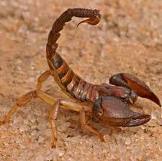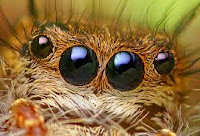- There are 172 different species in S.A
- Scorpionidae: Large pincers, thin tail
- Hadogenus: large flat bodies, venom not deathly
- Buthidae: large tail, small pincers, venom is deathly
- Large pincers, small tails
- Use pincers to catch prey (insects, spiders grasshoppers)
- Found in dry places
- When alarmed they hiss
- Thick tail
- Pose little threat to humans
- Last part of tail has venom in, the gland is in muscle, so when the muscle contract the venom comes out.
- They are grayish- yellow
- The sting is very dangerous
- Can squirt venom in eyes and blind you
- Long and thick tail
- Thin pincers
- thick tail
- Before they mate, it looks like they do a dance and it can last several hours
- They are yellow-orange with black markings
- live in sparsely populated desert
They have 8 legs and 3 body parts
They are found world wide, except in Antartica
They extrude silk from upto six types of silk glands whithin their abdomen
most spiders have cytotoxic venom, but some have neurotoxic venom
Web:
- It is used to catch food
- If something gets stuck in the web, the the spiders know immediately how big it is and where on the web it is
- They can change webs to adapt to environment
- Some birds use webs to make their nests
Black button spider:
- Black with red markings
- Most dangerous in SA
- venom is neurotoxic
- Egg sack: smooth, 10mm
- Long legs
- very aggressive
- venom is cytotoxic
- Sacs are shiny and tough
- lot deadly, but wound can be easily infected
- Brick brown colour
- Nocturnal
- Venom is cytotoxic and cause severe infection




No comments:
Post a Comment